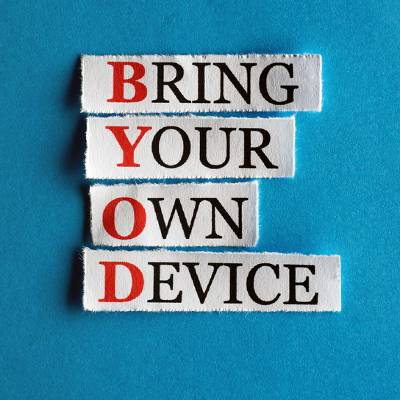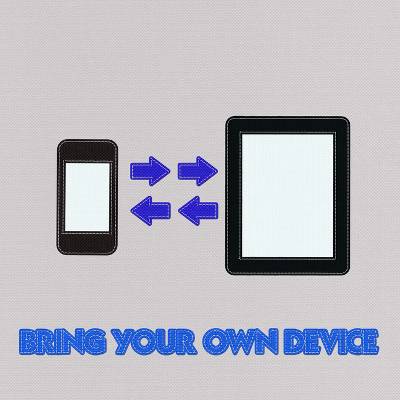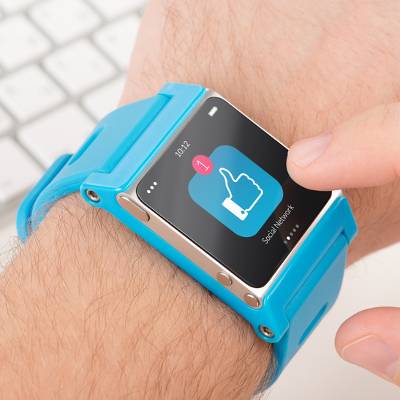Bring Your Own Device, or BYOD, is a common approach for businesses that want to take advantage of mobile technology to increase productivity. Instead of supplying each individual employee with company-owned devices, businesses allow employees to utilize their own devices for work-related purposes. While this is great on the budget, it’s only really effective, and safe, if the employee prioritizes security on their devices; otherwise, it’s a liability.
Macro Systems Blog
With mobile devices being such a large part of doing business, it’s imperative that your business has a plan to manage them. Many times this comes with a lot of hand-wringing. One of the biggest issues is whether or not the business invests in their employee mobility or if they simply demand that they gain use of employee-owned devices. In today’s blog we’ll go through the mobile management strategies of Bring Your Own Device (BYOD) and Corporate Owned, Personally Enabled (COPE).
There’s no denying that running a successful business comes with its fair share of costs, and many would argue that some of these costs are anything but fair. As such, it makes sense to try and minimize your operating expenses by any sustainable means. Let’s go over one such cost-saving measure you can implement—Bring Your Own Device policies—and address how to do so without shortchanging your organization's security in the process.
You’ve probably noticed the increased use of smartphones. No matter where you go, people are on their phones. For the modern business, employee smartphone usage can be a major source of irritation. Let's look into how smartphone usage helps and hurts a business and how to go about keeping employees from being on their phones for large chunks of the workday.
Bring Your Own Device is a popular trend in the modern business environment; it creates numerous opportunities for businesses to cut costs. But, this is only true if you implement a BYOD policy that your business can take advantage of. A BYOD can lead to considerable problems for unprepared businesses.
Mobile devices continue to be an important part of doing business, and organizations are ready and willing to accept them into the workplace environment with open arms. Yet, the fact remains that doing so can be of significant risk. Believe it or not, the majority of businesses overwhelmingly support mobile devices, but don’t put measures into place that can protect them in the event of a hacking attack or data leak.
The current business environment is no longer merely an office setting filled with workstations. The office is the coffee shop down the road, or the airport lobby where you're waiting for a flight. It’s the client’s office while you’re out on a business trip, or the venue for a business conference where you make valuable connections and exchange contact information. The office has gone mobile; your organization needs to adapt to this shift.
Do you let your employees bring their own devices in for use on your company network or Wi-Fi connection? If so, we’re sure that they love the freedom that you provide for them, but we must warn you of the dangers that this can bring to an otherwise careful business. We’ll discuss some of the benefits, as well as the pitfalls, of allowing your employees to use personal devices in the workplace.
 Recently, we’ve been approached by clients asking us about an employee wanting to set up their company email on their iPhone. The business owner thought, “Hey, that’s great! They’re getting more work done and I don’t need to pay for the phone or the service.” We then brought up a crucial point: “What happens when your employee leaves the company or loses their smartphone?”
Recently, we’ve been approached by clients asking us about an employee wanting to set up their company email on their iPhone. The business owner thought, “Hey, that’s great! They’re getting more work done and I don’t need to pay for the phone or the service.” We then brought up a crucial point: “What happens when your employee leaves the company or loses their smartphone?”
 Bring Your Own Device (BYOD) has been a hot IT trend for the past few years. Initially, everybody loved the idea of workers using their personal smartphone for work and organizations were quick to adopt BYOD. Now, after years of trying out the policy, companies and employees are having reservations about BYOD, making some even long for the days of Blackberry.
Bring Your Own Device (BYOD) has been a hot IT trend for the past few years. Initially, everybody loved the idea of workers using their personal smartphone for work and organizations were quick to adopt BYOD. Now, after years of trying out the policy, companies and employees are having reservations about BYOD, making some even long for the days of Blackberry.
 As a responsible business owner, you know that using the latest technology and running updated software is a key component to your company's network security. However, your employees may not value the latest tech like you do, which could result in a major data breach, despite your best efforts to keep your company current.
As a responsible business owner, you know that using the latest technology and running updated software is a key component to your company's network security. However, your employees may not value the latest tech like you do, which could result in a major data breach, despite your best efforts to keep your company current.
 One of the most popular business technology trends that we're seeing is employees bringing their own devices into the workplace (BYOD). This trend is due to the popularity of mobile devices (owned by over half of all U.S. adults). While this trend benefits companies in many ways like enhancing mobility, implementing BYOD for a business is not without risks.
One of the most popular business technology trends that we're seeing is employees bringing their own devices into the workplace (BYOD). This trend is due to the popularity of mobile devices (owned by over half of all U.S. adults). While this trend benefits companies in many ways like enhancing mobility, implementing BYOD for a business is not without risks.
 In our last blog article, we introduced the IT trend of employees bringing in their personal devices to work (BYOD). We looked at 5 ways BYOD can help your business, but BYOD is not without risks. In part 2, we will cover five risks BYOD brings to your company's network and what you can to do manage them.
In our last blog article, we introduced the IT trend of employees bringing in their personal devices to work (BYOD). We looked at 5 ways BYOD can help your business, but BYOD is not without risks. In part 2, we will cover five risks BYOD brings to your company's network and what you can to do manage them.
 BYOD is a popular business trend where employees are bringing their personal devices to work, and using them to be more productive. There are many benefits to BYOD, but it's not without risks to company security. A good compromise that keeps employees productive and networks secure is Select Your Own Device (SYOD).
BYOD is a popular business trend where employees are bringing their personal devices to work, and using them to be more productive. There are many benefits to BYOD, but it's not without risks to company security. A good compromise that keeps employees productive and networks secure is Select Your Own Device (SYOD).
 With the aid of technology, today’s workforce is more connected and faster at responding to problems than ever before. While this is great for productivity, it presents challenges for business owners to offer their workers current solutions that won’t hold them back. For many old-school employers, this may require a new way of approaching technology.
With the aid of technology, today’s workforce is more connected and faster at responding to problems than ever before. While this is great for productivity, it presents challenges for business owners to offer their workers current solutions that won’t hold them back. For many old-school employers, this may require a new way of approaching technology.
 Bring Your Own Device, or BYOD for short, is an important business trend that’s growing in popularity. BYOD allows users to bring their own devices to the workplace and use them for their everyday duties. While we often discuss the security issues that BYOD presents, it’s crucial to also mention the many benefits that BYOD offers for small and medium-sized businesses.
Bring Your Own Device, or BYOD for short, is an important business trend that’s growing in popularity. BYOD allows users to bring their own devices to the workplace and use them for their everyday duties. While we often discuss the security issues that BYOD presents, it’s crucial to also mention the many benefits that BYOD offers for small and medium-sized businesses.













